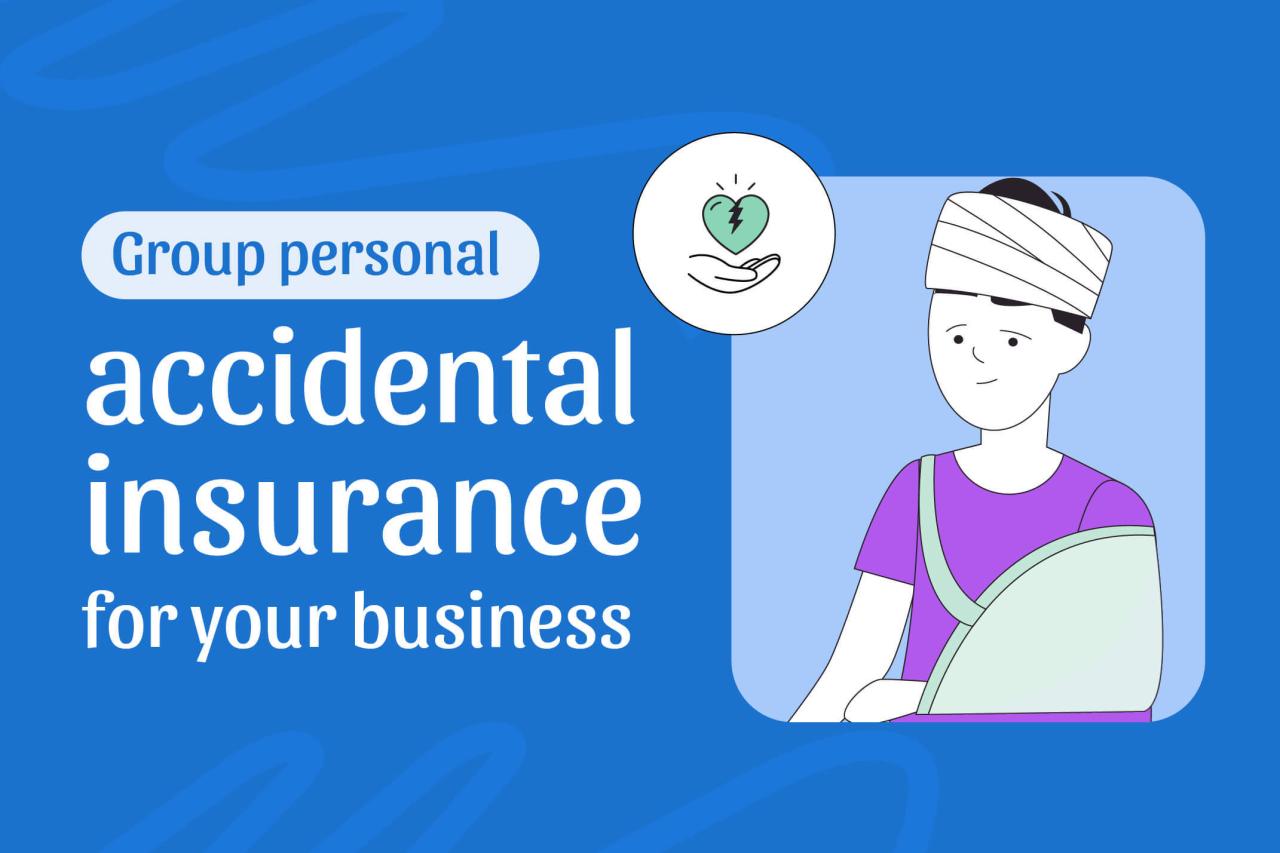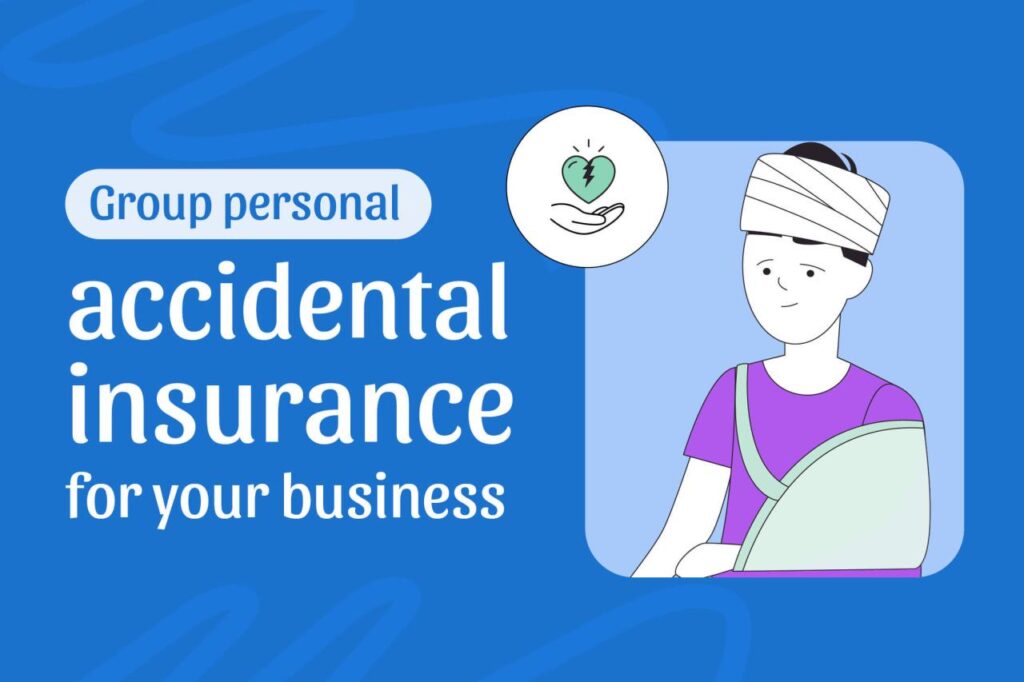Definition of Group Accident Insurance
Group accident insurance is a type of insurance policy that provides coverage for a group of people against accidents.
It is typically offered by employers to their employees, but it can also be purchased by other groups, such as schools, sports teams, or social organizations.
Group accident insurance can provide coverage for a variety of expenses, including medical expenses, lost wages, and funeral expenses.
Benefits of Group Accident Insurance
- Medical expenses: Group accident insurance can help cover the cost of medical expenses incurred as a result of an accident, such as hospital stays, doctor visits, and prescription drugs.
- Lost wages: Group accident insurance can help replace lost wages if you are unable to work due to an accident.
- Funeral expenses: Group accident insurance can help cover the cost of funeral expenses, such as burial or cremation costs, and transportation costs.
Types of Group Accident Insurance
Group accident insurance is offered in various types, each with distinct features and target groups. Understanding these types is crucial for selecting the most appropriate coverage for your needs.
-
Employer-Sponsored Group Accident Insurance
This type of insurance is provided by employers to their employees as part of their employee benefits package. It typically covers accidental injuries and deaths occurring during work hours or while performing work-related activities. The coverage amount and benefits vary depending on the employer’s plan and the specific policy terms.
-
Association-Sponsored Group Accident Insurance
This type of insurance is offered by professional or social organizations, such as alumni associations, sports clubs, or religious groups, to their members. It provides coverage for accidents that occur during sponsored events or activities organized by the association. The coverage amount and benefits may vary based on the association’s plan and policy terms.
-
Travel-Related Group Accident Insurance
This type of insurance is specifically designed for individuals or groups traveling domestically or internationally. It provides coverage for accidents that occur during the trip, including injuries, medical expenses, and accidental death. The coverage amount and benefits may vary depending on the policy terms and the specific travel itinerary.
Benefits of Group Accident Insurance
Group accident insurance offers a range of advantages that make it a valuable asset for individuals and families. These benefits include:
Financial Protection
In the event of an accident, group accident insurance can provide financial assistance to cover medical expenses, lost wages, and other related costs. This can help to reduce the financial burden on individuals and families, allowing them to focus on recovery and getting back to their daily lives.
Peace of Mind
Knowing that you and your family are protected in the event of an accident can provide peace of mind. Group accident insurance can help to reduce anxiety and stress, allowing you to enjoy life without the worry of financial hardship in the event of an unforeseen event.
Supplemental Coverage
Group accident insurance can provide supplemental coverage to existing health insurance plans. This can help to fill in gaps in coverage, ensuring that you have the financial resources you need to cover all accident-related expenses.
Real-Life Examples
Here are some real-life examples of how group accident insurance has helped individuals and families:
- A construction worker who suffered a broken leg on the job was able to use his group accident insurance to cover his medical expenses and lost wages, allowing him to focus on his recovery without worrying about financial hardship.
- A family who lost their home in a fire was able to use their group accident insurance to cover the costs of temporary housing and other expenses, helping them to get back on their feet after a devastating event.
- A student who was injured in a car accident was able to use her group accident insurance to cover her medical bills and tuition costs, allowing her to continue her education without interruption.
Eligibility and Enrollment

Eligibility for group accident insurance typically depends on factors such as age, occupation, and group membership. To enroll, individuals usually need to provide basic personal information and documentation like proof of age or employment.
Enrollment Process
The enrollment process for group accident insurance generally involves the following steps:
- Contact the insurance provider or group administrator.
- Complete an enrollment form, providing personal information and documentation.
- Review and sign the insurance policy.
- Pay the premium (if applicable).
Premiums and Costs
The premiums for group accident insurance policies vary depending on several factors. These factors include the age of the insured individuals, the risk level associated with their occupations, and the coverage limits specified in the policy.
Premiums are typically paid by the employer on behalf of the employees. However, in some cases, employees may be required to contribute a portion of the premium costs. Some insurance companies offer discounts for groups with a large number of insured individuals or for groups with a history of few claims.
Factors Influencing Premiums
- Age: Generally, younger individuals pay lower premiums than older individuals.
- Risk level: Individuals who work in high-risk occupations, such as construction workers or firefighters, will typically pay higher premiums than those who work in low-risk occupations, such as office workers.
- Coverage limits: The higher the coverage limits, the higher the premiums will be.
Payment of Premiums
Group accident insurance premiums are typically paid on a monthly or annual basis. Employers may deduct the premium costs from employees’ paychecks or pay the premiums directly to the insurance company.
Discounts and Cost-Saving Measures
Some insurance companies offer discounts for groups with a large number of insured individuals. Additionally, groups with a history of few claims may be eligible for premium discounts. Employers can also implement cost-saving measures, such as offering wellness programs or safety training, to help reduce the risk of accidents and lower premiums.
Claims Process
Filing a group accident insurance claim is a straightforward process designed to provide timely assistance during a challenging time.
Steps Involved
1. Report the Accident: Notify the insurance provider or administrator promptly after the accident occurs. Provide essential details, including the date, time, location, and a brief description of the event.
2. Complete Claim Form: Obtain the necessary claim form from the insurance company and fill it out accurately and completely. Include all relevant information, such as medical expenses, lost wages, and any other expenses incurred due to the accident.
3. Gather Documentation: Submit supporting documentation to substantiate your claim, including medical records, bills, and proof of income loss.
4. Submit Claim: Submit the completed claim form and supporting documentation to the insurance company or administrator.
Timeframe and Processing
Claims are typically processed within a reasonable timeframe, often within a few weeks or months, depending on the complexity of the claim. The insurance provider will review the claim and documentation to determine eligibility and coverage.
Challenges and Exclusions
It’s essential to note that certain challenges or exclusions may affect claim eligibility. These may include:
* Timely Reporting: Failure to report the accident within the specified timeframe may impact the claim’s validity.
* Coverage Exclusions: Certain types of accidents or injuries may not be covered under the group accident insurance policy.
* Pre-existing Conditions: Pre-existing conditions may not be eligible for coverage, unless specified in the policy.
* Misrepresentation: Providing false or misleading information on the claim form may result in denial of coverage.
Exclusions and Limitations
Group accident insurance policies typically include exclusions and limitations that define the specific situations or events that are not covered. These exclusions and limitations are designed to protect the insurance provider from excessive claims and to ensure the policy remains financially viable.
Understanding these exclusions and limitations is crucial to avoid any unexpected gaps in coverage. Here are some common exclusions and limitations found in group accident insurance policies:
Pre-existing Conditions
Most group accident insurance policies exclude coverage for pre-existing medical conditions. This means that any injuries or illnesses that existed before the policy’s effective date are not covered.
Intentional Injuries
Group accident insurance policies generally do not cover injuries that are intentionally self-inflicted or caused by another person’s intentional act.
Intoxication
Injuries sustained while under the influence of alcohol or drugs are often excluded from coverage.
High-Risk Activities
Certain high-risk activities, such as skydiving or bungee jumping, may be excluded from coverage.
War and Terrorism
Injuries sustained during war or acts of terrorism may not be covered under group accident insurance.
Comparison to Other Insurance Products
Group accident insurance offers unique coverage and benefits that differ from other types of insurance, such as life insurance, disability insurance, and health insurance. It specifically focuses on providing financial protection against accidental injuries and fatalities, while other insurance products may have broader coverage or different areas of focus.
Life Insurance
Group accident insurance is not a substitute for life insurance. Life insurance provides financial support to beneficiaries in the event of the policyholder’s death, regardless of the cause. In contrast, group accident insurance only covers accidental deaths and injuries.
Disability Insurance
Disability insurance provides income replacement if the policyholder is unable to work due to a disability. Group accident insurance can provide additional coverage for accidental injuries that result in disability, but it does not replace the broader coverage of disability insurance.
Health Insurance
Health insurance covers medical expenses incurred due to illness or injury. Group accident insurance can provide supplemental coverage for accidental injuries, but it does not cover medical expenses related to non-accidental health issues.





